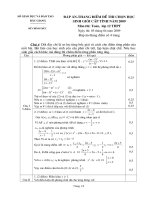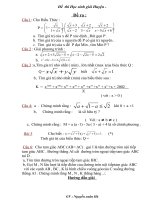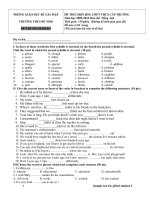Tài liệu Đáp án đề thi học sinh giỏi Anh lớp 9 TPHCM (2007-2008) docx
Bạn đang xem bản rút gọn của tài liệu. Xem và tải ngay bản đầy đủ của tài liệu tại đây (126.3 KB, 6 trang )
ĐÁP ÁN KỲ THI HỌC SINH GIỎI LỚP 9
BẬC PTCS CẤP THÀNH PHỐ
NĂM HỌC: 2007-2008
Đề chính thức Môn: TIẾNG ANH
Khoá ngày: 25-03-2008 Thời gian: 150 phút
PART ONE: LISTENING (20 points)
A. Listen to Patti and Alice talking. Decide whether the following statements are TRUE or FALSE
in your Answer Sheet, write True or False for each statement:
1. Alice is interested in looking for a new job. F
2. They will work in New York if they can get the job. T
3. Patti is now independent of her parents. T
4. Alice is a type of an adventurous girl. F
5. Patti has been working at the office longer than Alice has. F
B. Listen to a conversation between three people. Choose the option (A, B, C, or D) that best fits the
blank space in each statement or that best answer each question:
1. What kind of park is it ?
A. It’s a theme park. B. It’s an entertainment park.
C. It’s a park for camping. D. It’s a national park.
2. Which of the following is NOT true _________________?
A. People walk to the park. B. People get to the park by bicycle.
C. People go to the park in their car. D. People take a shuttle bus to the park.
3. The atmosphere at the park is ___________________.
A. exciting B. polluted C. quiet D. noisy
4. In order to go camping there, people have to __________________.
A. go in small groups B. reserve before hand
C. bring their food D. pay money
5. It is difficult to ask people to be careful about ___________________.
A. keeping their own food B. protecting the environment
C. making a fire D. littering
PART TWO: MULTIPLE-CHOICE (30 points)
Choose the word or phrase (A, B, C, or D) that best completes the sentence:
1. The little girl wasted half an hour _________________for her picture book.
A. look B. to look C. looking D. looked
2. He found a watch when he ____________________in the street.
A. had walked B. was walking C. walked D. had been walking
3. If he ___________________a little later yesterday, he couldn’t have met her at the airport to see
her off.
A. had come B. came C. was to come D. had to come
4. Cameron, __________________directed “The Titanic”, is one of the leading faces in Hollywood.
A. that B. whose C. whom D. who
5. Some of the students in this class are from HCMC, ________________from the provinces.
A. the others B. another C. the other D. others
6. __________________does it take you to do the washing?
A. How fast B. What speed C. How long D. What time
7. The boy forgot __________________the newspaper for his father on his way home.
A. buy B. to buy C. buying D. bought
8. It is about time he _________________for a general checkup. He may need the doctor’s advice.
A. had gone B. went C. were to go D. go
9. Your friendly attitude makes __________________for you to socialize.
A. its easy B. easier it C. it easier D. it more easily
10. They could have done it successfully ____________there been support from the local authority.
A. had B. if C. only if D. so long as
11. ________________students in this class have trouble finding time to work out.
A. Mostly all B. Many of C. Few D. A great deal of
12. No one in our class ____________________his opinion.
A. agrees with B. agree to C. agrees to D. agree with
13. She was singing to herself all the way home. She ______________very happy about something.
A. should have been B. will be C. would have been D. must have been
14. He was ________________________.
A. so bad singer B. such bad singer C. such bad a singer D. so bad a singer
15. Every time my aunt came from Hue, she ______________bring me a lot of delicious food.
A. could B. would C. might D. should
16. The young teacher sometimes lets the class go __________________control.
A. in B. out of C. throughout D. under
17. He is an efficient worker who always finishes his work ahead ________________schedule.
A. on B. in C. of D. for
18. He takes ___________________his father in many ways.
A. on B. up C. in D. after
19. The boy came __________________a cold walking in the rain for too long.
A. down with B. up with C. up against D. along with
20. The student sitting ________________the last row doesn’t seem to be paying attention.
A. on B. at C. in D. of
21. Most people __________________to pay their bills by check nowadays.
A. require B. used C. practice D. tend
22. He doesn’t take much exercise, __________________from walking the dog.
A. alone B. apart C. except D. besides
23. When I questioned him, he finally _________________stealing my pen.
A. admitted B. accused C. accepted D. confessed
24. As long as we __________________to the footpath, we won’t get lost.
A. keep B. stay C. follow D. remain
25. How much water does that tank __________________?
A. include B. keep C. consist D. contain
26. He is staying at my house _____________________.
A. all in all B. all at once C. for the time being D. in advance
27. The twins are so alike that I can hardly _____________________.
A. see them both B. tell them apart C. go for them D. work them out
28. I really want to help you, but I’ve got _________________organizing the school play.
A. my head over heels B. up to my ears C. my nose choked D. my hands full
29. Could I just do it right now? - _______________________
A. Yes, you could. B. Why not? Go ahead.
C. Not for me. D. Yes, let’s.
30. I think we should take some spare parts with us. - ________________________
A. If I were you I would. B. No. You can do it.
C. OK, just in case. D. Just my luck, man.
PART THREE: WORD FORM (40 points)
A. Use the correct forms of the words given in each sentence:
1. He is a music ____enthusiast______; he has a good collection of songs. (ENTHUSIASM)
2. Our teacher is a ___hot-tempered_____person. It seems as if he is always ready to shout. (HOT)
3. Drinking will ____worsen_________your ability to perform well on the stage. (BAD)
4. He had his phone __disconnected______because he is going away for some time. (CONNECT)
5. That __malpractice___________should be stopped at any rate. (PRACTICE)
6. Michael Jordan is one of the greatest ___basketballers__________of all times. (BASKET)
7. ____Carpentry___________is what he takes up as a hobby. (CARPENTER)
8. I wish I had her ____manageable______________hair. (MANAGE)
9. The fire was ___uncontrollable___________, and the loss was high. (CONTROL)
10. She is always __well-behaved____________and polite in front of the elders. (BEHAVE)
B. Use the correct forms of the words given to make a meaningful passage:
The person who directs the preparation of a play is the director. Sometimes the
(1)___playwright_____________(play), who wrote the play, works with him. One of the first things to
be done is to choose the cast, the actors and (2)__actresses___________(act). For this purpose, auditions
are held at which actors perform short pieces and the most (3)__suitable____________(suit) are chosen
for the parts in the play. Before the play is performed in front of an (4)__audience__________(audible)
of hundreds of theatre-goers, of course there are a lot of (5)___rehearsals_______(rehearse). At last the
(6)___first_____________(one) night comes! When the curtain goes down at the end, will there be
enthusiastic (7)___applause__________(applaud) or silence? Will many of the newspaper
(8)___reviews___________(view) be good or bad? What will the (9)__critic(s)________(criticize)
think? Everyone hopes for a hit that will run for months or years, but the play might be a flop and only
last a few days. It’s hard work in the theatre. There are evening (10)__performances_____(perform) six
nights a week and afternoon shows called matinees, once or twice as well.
PART FOUR: CLOZE TESTS (60 points)
A. Read the passage and choose the best option (A, B, C, or D) for each blank space:
When we think of a shark, we picture a (1)___________________, savage predator. Such
ideas might have been (2)______________________in our minds by movies that we have seen on
television and in cinemas. The most (3)______________________of these shows will probably be
“Jaws”. But this description is true only of a (4)______________________of the species. The idea that
all sharks kill and eat humans is a myth. Every year, more people are (5)_____________________by
lightning than by sharks.
Some (6)______________________, like the Great White shark and the Tiger shark, have
a(n) (7)______________________for attacking humans. Great White sharks feed mainly
(8)______________________ seals and porpoises. Some experts believe that the Great White shark
attacks humans (9)______________________a person while swimming looks very much like a seal
when (10)_____________________from below. The shark usually kills its
(11)____________________with one huge bite.
Sharks have very large and sharp teeth. These are used for cutting their food into shreds. A
shark may have up to three thousand teeth in its mouth (12)_____________________. These are
arranged in several (13)___________________. Only the front teeth are actively used for feeding. The
remaining teeth serve as (14)______________________teeth. To (15)____________________that a
shark may use more than twenty thousand teeth in its life.
1. A. swim-fast B. fast-swim C. fast-swimming D. swimming-fast
2. A. Happened B. Implanted C. occurred D. existed
3. A. important B. serious C. famous D. notorious
4. A. minority B. quantity C. member D. amount
5. A. eaten B. chased C. attacked D. damaged
6. A. sorts B. aspects C. species D. races
7. A. fame B. reputation C. calling D. instinct
8. A. with B. by C. in D. on
9. A. if B. since C. when D. so that
10. A. observed B. looked C. noticed D. witnessed
11. A. prey B. food C. enemy D. predator
12. A. at times B. at any one time C. any time D. at some time
13. A. rows B. queues C. layers D. groups
14. A. replaced B. replaceable C. replacement D. irreplaceable
15. A. estimate B. count C. express D. confirm
B. Read the passage and fill in each blank space with ONE appropriate word:
The need for money (1)__comes____________from the fact that different people in society
produce different things. This (2)__means____________that people (3)___depend___________on
each other for goods and (4)___food______________. Let us take the (5)___example__________of a
farmer who produces more food than he requires and a carpenter who earns a (6)___living__________
by selling the tables and chairs that he has made. It will be obvious that (7)__unless____________some
means of exchange is found, the farmer will not be able to get (8)___rid______________of his surplus
food and the carpenter, having nothing to eat, will (9)___starve___________to death! Clearly, the
possible means of exchange for them to use will be barter – in other (10___words_____________, to
exchange a certain amount of one kind of goods ((11)__let’s___________say flour) for a certain
amount of another (tables or chairs, in this case).
Obviously, barter can (12)__work______________only in a very simple society. In an
(13)__advanced_________society one cannot go around carrying things in the
(14)___hope____________that he can exchange them for the right things he needs.
So, we need something that will stand for the goods and services that we want to exchange.
That (15)__accounts__________for the origin of money.
PART FIVE: READING COMPREHENSION (10 points)
Choose the item (A, B, C, or D) that best answers the question or completes the unfinished statement
about the passage:
Surprisingly, no one knows how many children receive education in English hospitals, still
less the content or quality of that education. Proper records are just not kept.
We know that more than 850,000 children go through hospital each year, and that every child
of school age has a legal right to continue to receive education while in hospital. We also know there is
only one hospital teacher to every 1,000 children in hospital.
Little wonder the latest survey concludes that the extent and type of hospital teaching
available differ a great deal across the country. It found that half the hospitals in England which admit
children have no teacher. A further quarter has only a part-time teacher. The special children’s
hospitals in major cities do best; general hospitals in the country and holiday areas are worst off.
From this survey, one can estimate that fewer than one in five children have some contact
with a hospital teacher – and that contact may be as little as two hours a day. Most children
interviewed were surprised to find a teacher in hospital at all. They had not been prepared for it by
parents or their own school. If there was a teacher they were much more likely to read books and do
maths or number work; without a teacher they would only play games.
Reasons for hospital teaching range from preventing a child falling behind and maintaining
the habit of school to keeping a child occupied, and the latter is often all the teacher can do. The
position and influence of many teachers was summed up when parents referred to them as ‘the library
lady’ or just ‘the helper’.
Children tend to rely on concerned school friends to keep in touch with school work. Several
parents spoke of requests for work being ignored or refused by the school. Once back at school,
children rarely get extra teaching, and are told to catch up as best they can.
Many short-stay child-patients catch up quickly. But schools do very little to ease the anxiety
about falling behind expressed by many of the children interviewed.
1. The writer of this article points out that ________________________________
A. not enough is known about hospital teaching.
B. every child in hospital receives some teaching.
C. hospital teaching is of poor quality.
D. many children pass through hospital each year.
2. The words ‘Little wonder’ in line 6 is closest in meaning to
A. It’s hardly surprising B. It’s ironical
C. It’s likely D. It’s common
3. This latest survey found that hospital teaching is provided _______________________
A. for the whole of the usual school day.
B. for a small proportion of children.
C. in every children’s hospital in the country.
D. by full-time teachers.
4. It seems that the children interviewed in hospital _________________________
A. like having maths lessons regularly.
B. wanted to play games most of the time.
C. did not expect to receive any teaching .
D. did not want any contact with their schools.
5. It is suggested that most teachers of children in hospital were ______________________
A. successful in getting the cooperation of parents.
B. unable to get help from other hospital staff.
C. unable to provide a proper teaching programme.
D. in a position of great influence in the hospital.
PART SIX: ERROR IDENTIFICATION (10 points)
Choose the underlined word or phrase (A, B, C, or D) that needs correcting:
1. The man’s application was turned down because he was found incapable to do the job.
A B C D
2. You have made remarkable progresses in your study in the last few weeks.
A B C D
3. She has spent many sleepless nights to examine the question raised by one student.
A B C D
4. One of the weaknesses in English is that it is not pronounced the way it is written.
A B C D
5. What I know are that the witness still needs to be protected.
A B C D
6. In the first meeting, a headmaster briefly introduced me to the school’s teaching staff.
A B C D
7. I had no sooner put the phone down when she rang back.
A B C D
8. That poor little boy never has any successful result, no matter however hard he tries.
A B C D
9. Motor vehicles are among the majoring causes of air pollution in big city centers.
A B C D
10. Few people would want to sacrifice the convenience of having on their own transport means.
A B C D
PART SEVEN: SENTENCE TRANSFORMATION (30 points)
Rewrite each sentence in such a way that it means almost the same as the one printed before it.
In the last five sentences, you have to use the word in bold, and you mustn’t change the word in
any way:
1. The police towed away my car.
I had my car towed away by the police.
2. Her parents moved to Hanoi ten years ago.
It is ten years since her parents lived in Hanoi.
3. He can’t have known anything about the murder, I suppose.
I’m absolutely certain that he didn’t know anything about the murder.
4. There are more tourists in the city this year than ever before.
Never before have there been as/so many tourists in the city as this year.
5. Are you fed up with having nothing to do?
Don’t you wish you had something to do?
6. We could just see him in the crowd. (make)
We could just make him out in the crowd.
7. The area is so polluted that it is hard to live there. (pollution)
Such is the pollution of the area that it is hard to live there.
8. Why were you so impatient in such a situation? (supposed)
You are supposed to have been patient in such a situation.
9. He is likely to arrive late again. (probably)
He will probably arrive late again.
10. I don’t mind if you leave now. (objection)
I have no objection to you/your leaving now.
THE END OF THE TEST









